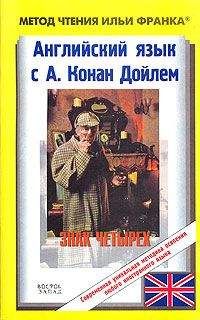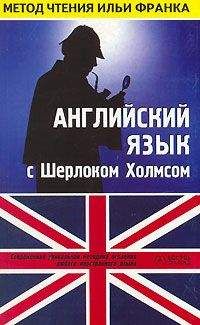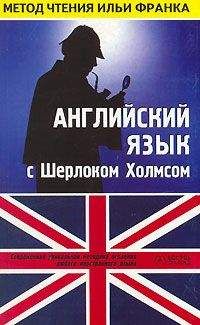surprise [ [email protected]'praIs], monkey ['mVNkI], straight [streIt]
"A wooden-legged man?" said Holmes, with bland surprise.
"Yes, sir, a brown, monkey-faced chap that's called more'n once for my old man. It was him that roused him up yesternight, and, what's more, my man knew he was comin', for he had steam up in the launch. I tell you straight, sir, I don't feel easy in my mind about it."
"But, my dear Mrs. Smith," said Holmes, shrugging his shoulders, "you are frightening yourself about nothing. How could you possibly tell that it was the wooden-legged man who came in the night? I don't quite understand how you can be so sure."
"His voice, sir (его голос, сэр). I knew his voice, which is kind o' thick and foggy (я узнала его голос, такой хриплый и невнятный; kind of — вроде, отчасти; как будто; thick — толстый; хриплый, сиплый, низкий; foggy — туманный; неясный; fog — туман). He tapped at the winder, — about three it would be (он постучал в окно — было около трех, наверное; winder = window). 'Show a leg, matey,' says he (вставай, приятель, — сказал он; to show a leg — вставать с постели; mate — товарищ; напарник; matey — друг, приятель): 'time to turn out guard (время смены караула; guard — охрана; караул).' My old man woke up Jim, — that's my eldest (мой муж разбудил Джима — это мой старший), — and away they went, without so much as a word to me (и они ушли, ни слова мне не сказали). I could hear the wooden leg clackin' on the stones (я слышала, как его деревянная нога стучала по камням; to clack — трещать; щелкать)."
"And was this wooden-legged man alone (и был этот одноногий один)?"
"Couldn't say, I am sure, sir (не могу точно сказать: «не могу сказать, я уверена», сэр). I didn't hear no one else (= I didn't hear anyone else — я никого больше не слышала)."
"I am sorry, Mrs. Smith, for I wanted a steam launch (сожалею, миссис Смит, мне нужен был паровой катер), and I have heard good reports of the (и я слышал хорошие отзывы о) —— Let me see, what is her name (дайте подумать, как же это его называют)?"
"The Aurora, sir («Аврора», сэр)."
matey ['meItI], Aurora [O:'rO: [email protected]]
"His voice, sir. I knew his voice, which is kind o' thick and foggy. He tapped at the winder, — about three it would be. 'Show a leg, matey,' says he: 'time to turn out guard.' My old man woke up Jim, — that's my eldest, — and away they went, without so much as a word to me. I could hear the wooden leg clackin' on the stones."
"And was this wooden-legged man alone?"
"Couldn't say, I am sure, sir. I didn't hear no one else."
"I am sorry, Mrs. Smith, for I wanted a steam launch, and I have heard good reports of the —— Let me see, what is her name?"
"The Aurora, sir."
"Ah! She's not that old green launch with a yellow line, very broad in the beam (а! это не тот старый зеленый катер с желтой полосой и очень широкий; line — веревка, шнур; линия; черта; beam — луч; бимс; ширина судна)?"
"No, indeed (совсем нет). She's as trim a little thing as any on the river (очень изящненький катерок, не хуже любого другого на реке: «он такая же хорошенькая маленькая штучка, как любой другой на реке»; trim — аккуратный; элегантный). She's been fresh painted, black with two red streaks (его недавно покрасили в черный цвет с двумя красными полосами; fresh — свежий; fresh painted — свежепокрашенный)."
"Thanks (спасибо). I hope that you will hear soon from Mr. Smith (надеюсь, вы скоро получите весточку от мистера Смита). I am going down the river (я собираюсь вниз по реке); and if I should see anything of the Aurora I shall let him know that you are uneasy (и если я увижу «Аврору», я передам ему: «дам ему знать», что вы беспокоитесь; uneasy — неловкий; беспокойный, тревожный). A black funnel, you say (черная труба, вы сказали)?"
"No, sir (нет, сэр). Black with a white band (черная с белой полосой; band — тесьма, лента; полоса)."
"Ah, of course (а, конечно). It was the sides which were black (это бока черные). Good-morning, Mrs. Smith (до свидания, миссис Смит). — There is a boatman here with a wherry, Watson (вон лодка с лодочником, Ватсон; wherry — лодка, ялик). We shall take it and cross the river (мы возьмем ее и пересечем реку).
broad [brO:d], wherry ['werI]
"Ah! She's not that old green launch with a yellow line, very broad in the beam?"
"No, indeed. She's as trim a little thing as any on the river. She's been fresh painted, black with two red streaks."
"Thanks. I hope that you will hear soon from Mr. Smith. I am going down the river; and if I should see anything of the Aurora I shall let him know that you are uneasy. A black funnel, you say?"
"No, sir. Black with a white band."
"Ah, of course. It was the sides which were black. Good-morning, Mrs. Smith. — There is a boatman here with a wherry, Watson. We shall take it and cross the river.
"The main thing with people of that sort," said Holmes, as we sat in the sheets of the wherry (главное с такими людьми: «с людьми такого сорта», — сказал Холмс, когда мы сели в лодку; sheet — простыня; парус; шкот), "is never to let them think (никогда не давать им заподозрить: «не позволять им подумать») that their information can be of the slightest importance to you (что вам важно то, что они могут сказать: «что их информация может иметь малейшее значение для вас»; importance — важность; значение). If you do, they will instantly shut up like an oyster (если они это почувствуют, они немедленно замолчат как воды в рот набрали: «закроются как устрицы»; to shut up like an oyster — замолчать; прикусить язык; как воды в рот набрал; oyster — устрица). If you listen to them under protest, as it were (если вы выслушиваете их словно нехотя; protest — протест), you are very likely to get what you want (очень вероятно, что вы услышите: «получите» все, что вам надо)."
"Our course now seems pretty clear," said I (теперь наш план действий довольно ясен, — сказал я; course — курс, направление; линия поведения, образ действия).
"What would you do, then (и что бы вы тогда предложили делать: «сделали бы»)?"
"I would engage a launch and go down the river on the track of the Aurora (я бы нанял катер и отправился вниз по реке в поисках: «по следу» «Авроры»; to engage — привлекать; нанимать; track — след)."
importance [Im'pO:t(@)ns], protest (существительное) [' [email protected]], engage [In'geIdZ, en'geIdZ]
"The main thing with people of that sort," said Holmes, as we sat in the sheets of the wherry, "is never to let them think that their information can be of the slightest importance to you. If you do, they will instantly shut up like an oyster. If you listen to them under protest, as it were, you are very likely to get what you want."
"Our course now seems pretty clear," said I.
"What would you do, then?"
"I would engage a launch and go down the river on the track of the Aurora."
"My dear fellow, it would be a colossal task (мой дорогой друг, это было бы колоссальное предприятие; fellow — человек, парень; приятель, товарищ; task — урочная работа; задача). She may have touched at any wharf on either side of the stream between here and Greenwich (он мог причалить на любой пристани на любой стороне реки отсюда до Гринвича; to touch — /при/касаться, трогать; заходить в порт; stream — поток, река). Below the bridge there is a perfect labyrinth of landing-places for miles (ниже моста здесь на мили простирается настоящий лабиринт причалов; perfect — совершенный; настоящий; landing-place — место высадки, пристань). It would take you days and days to exhaust them (на то, чтобы посетить их все, ушло бы много дней; to exhaust — исчерпывать), if you set about it alone (если бы вы взялись за это в одиночку; to set about — начинать, браться)."
"Employ the police, then (тогда призовите на помощь полицию; to employ — держать на службе; использовать)."
"No (нет). I shall probably call Athelney Jones in at the last moment (я, скорее всего, приглашу Этелни Джонса в последний момент). He is not a bad fellow, and I should not like to do anything which would injure him professionally (он неплохой человек, и мне бы не хотелось совершить что-то, что могло бы повредить его карьере; to injure — ранить; навредить; professionally — профессионально). But I have a fancy for working it out myself, now that we have gone so far (но мне бы хотелось раскрыть это дело в одиночку, раз уж мы зашли так далеко; fancy — иллюзия; каприз, прихоть; to work out — решать; выполнить)."
colossal [ [email protected]'lOs(@)l], Greenwich ['gri:nIdZ], exhaust [Ig'zO:st], injure [' [email protected]]
"My dear fellow, it would be a colossal task. She may have touched at any wharf on either side of the stream between here and Greenwich. Below the bridge there is a perfect labyrinth of landing-places for miles. It would take you days and days to exhaust them, if you set about it alone."
"Employ the police, then."
"No. I shall probably call Athelney Jones in at the last moment. He is not a bad fellow, and I should not like to do anything which would injure him professionally. But I have a fancy for working it out myself, now that we have gone so far."
"Could we advertise, then, asking for information from wharfingers (может, тогда дать объявление с просьбой к владельцам пристаней сообщить об «Авроре»; to advertise — рекламировать; помещать объявление; information — информация, сведения; wharfinger — владелец пристани; управляющий пристанью)?"
"Worse and worse (это было бы еще хуже: «хуже и хуже»)! Our men would know that the chase was hot at their heels (наши преследуемые: «наши люди» тогда узнали бы, что погоня идет за ними по пятам; hot — горячий; близкий к цели; идущий по пятам), and they would be off out of the country (и они бы покинули страну). As it is, they are likely enough to leave (при сложившихся обстоятельствах они достаточно вероятно покинут /страну/ и так; as it is — и так; при сложившихся обстоятельствах), but as long as they think they are perfectly safe they will be in no hurry (но пока они думают, что они в полной безопасности, они не будут спешить). Jones's energy will be of use to us there (энергия Джонса нам тут очень кстати; use — польза), for his view of the case is sure to push itself into the daily press (так как его виденье дела наверняка попадет в газеты; to push — толкать; проталкивать; daily — ежедневный; повседневный; каждодневный; press — печать, пресса), and the runaways will think that every one is off on the wrong scent (и беглецы будут думать, что все идут по ложному следу)."
"What are we to do, then?" I asked, as we landed near Millbank Penitentiary (и что же нам тогда делать? — спросил я, когда мы сошли на берег около миллбенкского исправительного дома; penitent — раскаивающийся; кающийся; подвергнувшийся наказанию).




